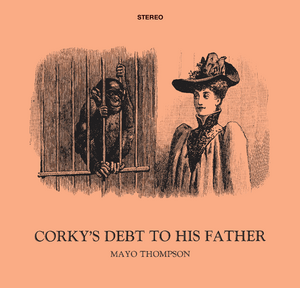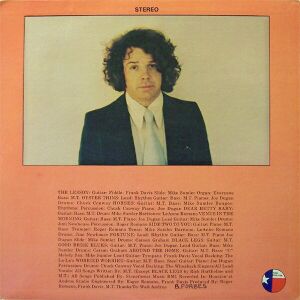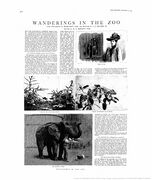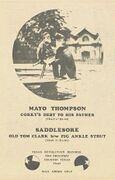Corky's Debt to His Father: Difference between revisions
No edit summary |
No edit summary |
||
| Line 104: | Line 104: | ||
|- | |- | ||
|{{flagdeco|1=US}} | |{{flagdeco|1=US}} | ||
|[[File:Shows-2023-08-12-image1. | |[[File:Shows-2023-08-12-image1.png|center|frameless|28x28px]] | ||
|[[Shows/2023-08-12|August 12, 2023]] | |[[Shows/2023-08-12|August 12, 2023]] | ||
|New York City | |New York City | ||
Revision as of 17:41, 6 July 2023
Corky's Debt to His Father is the first solo album by Mayo Thompson.
| Corky's Debt to His Father | |
|---|---|
 | |
 | |
| Studio album by Mayo Thompson | |
| Released | 1970 |
| Recorded | 1970 |
| Studio | Walt Andrus Studio
Houston, Texas |
| Label | Texas Revolution |
Track list
| No. | Title | Length |
|---|---|---|
| 1. | "The Lesson" | 2:39 |
| 2. | "Oyster Thins" | 6:00 |
| 3. | "Horses" | 3:09 |
| 4. | "Dear Betty Baby" | 3:47 |
| 5. | "Venus in the Morning" | 2:30 |
| No. | Title | Length |
|---|---|---|
| 1. | "To You" | 2:50 |
| 2. | "Fortune" | 2:11 |
| 3. | "Black Legs" | 3:50 |
| 4. | "Good Brisk Blues" | 3:07 |
| 5. | "Around the Home" | 2:50 |
| 6. | "Worried Worried" | 5:03 |
| Total length: | 37:56 | |
Background
- Recording began in February 1970
- Released mail-order only in 1970 by Texas Revolution
- Instrumental B-side outtake: Woof
- Released a single as in January 1971 as Saddlesore: Old Tom Clark
- Reissued in the 80s by Glass Records
- Reissued in 1994 by Drag City
- Mayo Thompson played the full album in concert in 2013 and 2019
Further reading: Jasper Leach and Joel Minor's article "Fortune, Fates, And Random Chances: The story of Mayo Thompson’s Corky’s Debt to His Father"
Mayo Thompson and The Corky Band
In 2019, Thompson began performing the album live in full for the album's 50th anniversary. The performances were put on hold in March 2020 due to the COVID-19 pandemic. They will resume in Summer 2023.
| Date | City | Venue | Notes | |||
|---|---|---|---|---|---|---|
| December 8, 2019 | New York City | NY | Le Poisson Rouge | |||
| January 9, 2020 | Los Angeles | CA | Hammer Museum | |||
| March 25, 2020 | Chicago | IL | Constellation | cancelled | ||
| August 12, 2023 | New York City | NY | Le Poisson Rouge | |||
| August 30, 2023 | Los Angeles | CA | The Chapel | |||
| August 31, 2023 | Los Angeles | CA | Zebulon |
Personnel
Mayo Thompson - vocals, guitar, bass
Additional musicians
Mike Sumler, Joe Dugan (piano), Chuck Conway (drums), Jimi Newhouse (drums), Carson Graham (drums), Frank Davis, Le Anne Romano (baritone horn), Roger Romano, The La La's (backing vocals), The Whoaback Singers (backing vocals)
Technical
- Mayo Thompson - producer
- Frank Davis - producer, engineer
- Roger Romano - producer, engineer
Cover art
The cover image is an illustration by John Charles Dollman for an article in the British newspaper The Graphic published September 10, 1892.[1]
-
Wanderings in the Zoo, 1892[2]
Releases
Texas Revolution
1970
-
Ad in Rolling Stone, January 7, 1971
Glass
December 1985[3]
Drag City
June 20, 1994
Retrospectives
Mayo Thompson, 1996[4]
Walt Andrus was head of the best studio in Houston, and in that particular period, he recorded everybody [...] The technical level came out of traditional recordings of all kinds of regular kinds of music. [...]
Pop music has changed, obviously, with punk, completely. But at the time that I made the solo album, it was Walt Andrus' own label. He had a lot of money which he had gotten to start a label [...] He was partners with a couple lawyers in Southern California who had gotten some money to do a blues reissue from somebody and blah blah blah, and there was this kind of money, so we were able to make this record. And he was like a few weeks short of really having it all together, Texas Revolution being really together. And then the whole partnership collapsed and fell apart for some reason. And the dream ended. But that would have been a really...that was going to be an interesting project, because Walt Andrus and Frank Davis, he was also an early hero of mine, a real legend in Houston, a great musician.
[...] it does have a different character from the Red Krayola material. I would say that is largely informed by the fact that the musicians were all from elsewhere. They were not players that I had worked with. People I knew, but I didn't work with them before, from other kinds of bands and stuff like that. Also, the material was very personal, the lyrics were very personal, whereas the Red Krayola was seldom personal. [...]
The period of the complete failure of the solo record--when I found out that people--I had a friend who lived in a commune in New Mexico, and he'd get up and put that record on and people would throw things at him--"Don't put that goddamn record on again!" They hated it. They just didn't want to hear this stuff. And I thought, I wonder why? So I delved more deeply into one of our original thoughts about music. It was original to us, it was one of the origins for our impulse, which was that music is instrumental, in the sense that it's a form in which you can say various things and do various things. Those formal characteristics of music have their own weight and gravity. What you do is you balance them against the other kinds of things that you want to put into them as a carrier or some kind of support structure, if you like.
Mayo Thompson, 2015[5]
Corky is a portrait of me. It shaped up battling clichés, genres that are like black holes which swallow my novel solutions to the same problems everybody has, while recognizing there is no escape, only twisting the familiar to my ends, insisting on my take on them, presenting my ideas effectively via negativa. That record was made post-Crayola/International Artists, with Frank Davis and Roger “Rock” Romano producing. I met Frank hanging out at the Jester Lounge—a Houston folk venue. Rock I knew from college. He’s a great dude, a tower of Houston musical power from the start.
Rock Romano, 2017[6]
I loved workin' with Mayo [...] I co-produced [Corky's Debt to His Father] with him and Frank Davis, and it's, it's a legendary cult album now [...] that was one of the great things that I got to do as a producer, at Andrus, and of course when we finished it, Frank took it up to the people that we knew at Uni and they looked at this, and they said, man, we can't do anything with this [...] so we just got it pushed back in our face and Walter released it on his own label, and they only probably printed a thousand copies, and I'm one of the few people that has one. Actually, it was [...] redone later on. Mayo brought me some redone copies and instead of Texas Revolution Records, it was done on Drag City Revolution Records. They even made a special label for it, imitating the original label.
Reviews
New Musical Express
January 18, 1986[7]
Richard North
Apparently this "legendary" and rare LP was first released in Texas in 1972 with only 500 pressed. Hats off to Glass for resurrecting it. One always looks forward to Mayo's output 'cause of his kooky-colourful work with Red Crayola, Pere Ubu, et al. A fine track record which is only enhanced by Corky's Debt. [...]
CMJ New Music Report
June 13, 1994[8]
Drag City has reissued Corky's Debt To His Father, the hard-to-find 1970 solo album by Mayo Thompson, leader of the Red Crayola for almost three decades and a member of Pere Ubu in the early '80s. Corky, his only solo outing, is unlike anything he's done before or since, with a focus on melody and twisted lyrics in song structures that are relatively conventional compared to the psychedelic freakouts, experimentation and jagged pop of the Red Crayola. The beautiful ballad "Dear Betty Baby" is an unqualified masterpiece. Look for the first two Red Crayola albums to be reissued on the Collectibles label and a new Red Crayola album in the fall, with Thompson joined by members of Gastr Del Sol.
Chicago Reader
June 16, 1994[9]
John Corbett
Chicago Tribune
1994
Greg Kot
Recorded 24 years ago in Houston for an obscure record label and then all but forgotten, "Corky's Debt to His Father" has been reissued on CD, its considerable wonders undiminished. Thompson has fashioned a significant legacy in underground circles as a producer, talent scout and recording artist (notably with the Red Crayola), and this record presents his catholic tastes and eccentric talents at their most accessible. Ranging from baroque pop worthy of Van Dyke Parks to stark acoustic ballads and barrelhouse blues, "Corky's Debt ..." is musically dazzling. The sophistication of the arrangements and writing — particularly on "To You" and "Around the Home" — makes Thompson's sometimes uncertain tenor seem even more vulnerable as he pours out his erotic longings.
Tower Pulse
1994
Scott Miller
Mayo Thompson's Corky's Debt to His Father isn't being reissued as much as it's finally having its day. The album was recorded in 1970 after Thompson's ground-breaking yet completely overlooked group, the Red Krayola, temporarily disbanded. It's a beautiful and introspective album, along the linen of Big Star's 3rd or the Beach Boys' late-'60s work. Backing off from the urgent stabs at ideas and possibilities that characterized Krayola, it shows a more immediately traditional (coherent) approach toward songwriting. But aside from a small U.K. repressing in the mid-'80s, it was out of print for almost a quarter century prior to the recent Drag City reissue (the label also has a new Krayola album due soon).
"I started making music because I thought it was wide open," says Thompson from his home in Houston. "That all one did was have ideas — perform these ideas — that interesting ideas did come through and that it was possible to do interesting things in this framework." Though it may not initially sooths, this is not an alienating record. It has a timeless quality — not fitting readily into any one category or era. Thompson was taking an honest shot at competing in the solo artist world that prevailed in the early '70s — presenting a stimulating alternative to the mind-numbing strains of James Taylor and friends. "I was anxious to distinguish myself from the people with whom I saw myself in some generic association — the solo artist, the songwriter." Corky operates on several levels and deserves to be heard. It's humorous and wistful, lyrically stimulating — bluesy at times, though it's more like the blues are playing Thompson than the other way around. He writes in a style all his own, twisting common language into poetry. Always uniquely Thompson, Corky blurs boundaries and begs only for an attentive ear.
The Trouser Press guide to '90s rock
1997[10]
In 1970, Thompson actually did record a solo album, Corky's Debt to His Father, which got an obscure local-label issue at the time in Texas, was revived in England years later and was finally introduced to American CD racks through the good offices of Drag City. A left-field version of a blues and neo-vaudeville album — played mostly acoustic on slide guitar, piano, bass and elementary traps, with some horns and electricity — Corky's Debt doesn't sound much closer to any mainstream in 1995 than it would have done a quarter-century earlier. The fairly titled "Good Brisk Blues" might have come from a Dylan bootleg, and "Venus in the Morning" does suggest a functional knowledge of barrelhouse music, but the lyrics ("they cover her politely from all indelicate eyes") are from a completely different realm. A self-conscious embrace of abnormality in all its glorious dislocation.
References
- ↑ https://www.mediastorehouse.com/fine-art-finder/artists/english-school/wanderings-zoo-engraving-22221880.html
- ↑ [The Graphic illustrated newspaper September 10, 1892 pg. 22 https://www.britishnewspaperarchive.co.uk/viewer/BL/0000057/18920910/031/0022]
- ↑ Music Week, December 21/28, 1985
- ↑ http://www.richieunterberger.com/mayo.html
- ↑ https://bombmagazine.org/articles/mayo-thompson/
- ↑ https://scholarship.rice.edu/bitstream/handle/1911/103222/wrc08974_transcript.pdf?sequence=8&isAllowed=y
- ↑ https://www.rocksbackpages.com/Library/Article/mayo-thompson-icorkys-debt-to-his-fatheri-glass
- ↑ https://worldradiohistory.com/Archive-All-Music/CMJ/1994/CMJ-New-Music-Report-1994-06-13.pdf
- ↑ https://chicagoreader.com/music/a-genre-of-one/
- ↑ https://archive.org/details/trouserpressguid00robb_1/page/597/mode/1up




